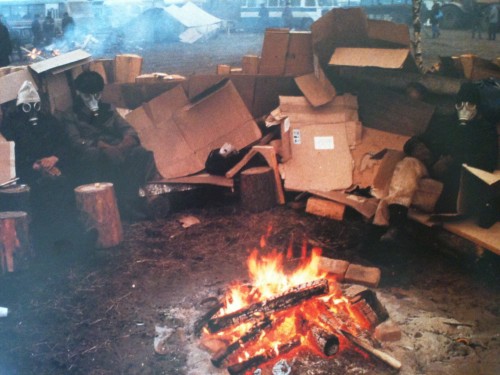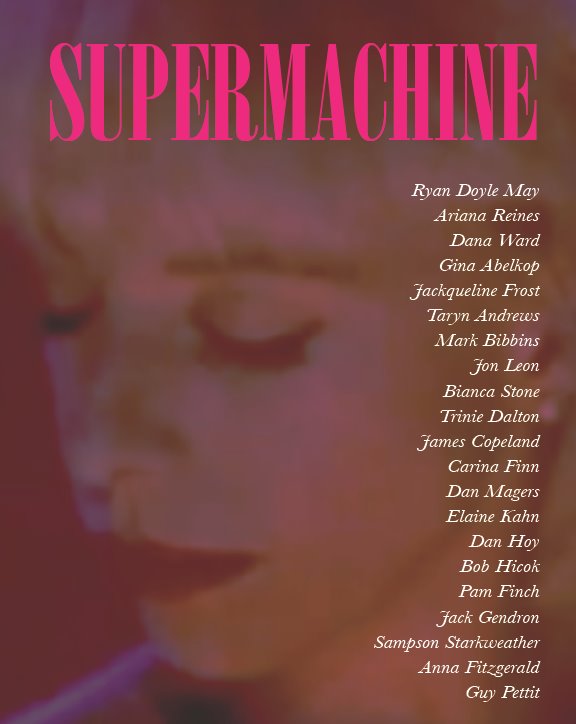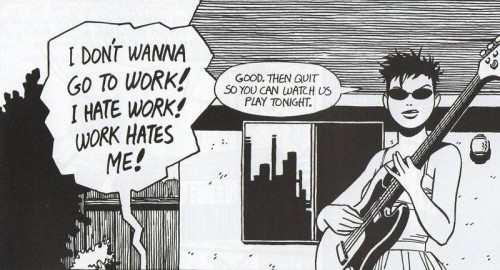The Weave

Poet Eve Grubin told me, many years ago, that a strong poem possesses a weave, an interplay between light and darkness, self and other, internal and external, the lucid and the paradox. She said that it is this weave, not necessarily a linear narrative and firm conclusion, which binds a strong poem together. This might have been my first brain-opening to experimental literature—whatever experimental literature is.
I thought about the weave again when I recently read Rae Armantrout’s essay “Feminist Poetics and the Meaning of Clarity.” Have you read it? It’s good, and it was published in 1992, the year between Nevermind and In Utero. The essay describes the poetry of that time as “univocal…often culminating in a sort of linear epiphany.”
Armantrout depicts a homogenized experience of poetry, one which leaves little room for ambivalence and the interplay of the weave. She then pits this singleness of focus (which I view as an arrow, a Castro peen if you will) against “the core of woman’s condition.” What is the core of woman’s condition? Well, Armantrout says that woman is “internally divided against herself” and I’ll be the first one to back that up.
So, let’s think. A poem possessing a strong weave contains opposing forces. The experience of being a woman on this planet also contains opposing forces (though I’d be willing to bet it does for some dudes too). Is poetry today less linear, more weave-permissive than it was in 1992? Were any of you alive in 1992?
A final thought. In the essay, Armantrout examines Jacques Lacan’s notion that women are excluded from the symbolic order. She perceives this exclusion as a “moment of freedom” and an opportunity to “challenge the contemporary poetic convention of the unified voice.” I can get down with this, in the sense that if I pick up Anne Sexton’s The Death Notebooks (luv u Anne!) a little alarm might go off in my head like “too juicy” or “not trendy” or “do not admit to this on Goodreads.” And I’ve definitely felt at times that my own work is too juicy or messy or does not contain enough self-sustaining deer to comply with today’s contemporary poetic convention(s). Ultimately, though, I don’t know if this discomfort is about being a woman, or an outsider, or a poet, or a human.
39
Interviewer: How much rewriting do you do?
Hemingway: It depends. I rewrote the ending of Farewell to Arms, the last page of it, 39 times before I was satisfied.
Interviewer: Was there some technical problem there? What was it that had stumped you?
Hemingway: Getting the words right.
(Ernest Hemingway, “The Art of Fiction,” The Paris Review Interview, 1956)
“I was born to be shallow; I wasn’t born to be deep.”
For Tim Jones-Yelvington, who recently began an interesting conversation about surfaces and the superficial…
PS – from the comment stream on Tim’s post, A D Jameson and I have decided to hold a conversation/debate/dialogue on experimental literature, the role/function of art, and other gooey topics, this December here at HTMLGIANT…so, stay tuned!
A System?
Couldn’t locate a book today. That made me a tadpole late for class. But I required down sticky/icky low immersion, that Cormac thing, to show a student. Student penned a meth flophouse story. I needed to tell this student, “Get your story grittier. You went so far and you got squeamish. Go further. Get more squeamish. [Here I am making a squeezing hand motion, God knows why.] Boil your stomach in its own rank juices! No disgust in the writer, no disgust in the reader. Something…” Etc. I wanted to show him Suttree, of course, page where Harrogate gets a side job cleaning out a totaled car at a junkyard. Five “boys” were in the car when it was “Run head on by a semi.” Then this:
He propped his feet against one door and gave it a good kick and it fell open. Some kind of globular material hung down over the steering column. He climbed out of the car and bent down to find the heads of the bolts beneath the seats. The carpeting had been rained on and was lightly furred with pale blue mold. Something small and fat and wet with an umbilical looking tail lying there. A sort of slug. He picked it up. A human eye looked up at him from between his thumb and forefinger.”
But I couldn’t find Suttree, damnit. (In the end this was the fault of Matt Bell, Charles Bukowski, and Philip Young—their three books are the same cover hue [brown] as Suttree so I kept grabbing the wrong title.) I knew Suttree was there—I could smell the thing, all that leprous river mud and catfish whiskey breath. For not the first time I gazed googly-eyed at my tumuli of books and thought, “Do I need a system?” I see the practicality of a system, but also the danger. (Oh, all those failed systems) And I see book-piles as thickets and wonder-clumps, not some cultivated shrubbery/statue garden. I like heaps. Slippery heaps of books. But that isn’t going to work. Do you have a system? How do you find a written thing?
I WANT TO PAY A LOT FOR PREMIUM DIGITAL CONTENT
let me pay for premium online content.
i tried to get a digital-only subscription to the new yorker. but it doesn’t exist. i want it in my car service when i leave my advertising agency at 10:30 pm. i am always busy. i need speed and i desire information. i want to have access to that content in a fluid way.
i would pay 100 dollars a year for a digital subscription to the new yorker. 30 dollars more than the physical paper subscription price.
i want to read a digital version of vanity fair on my phone and not have to throw away a physical magazine. when i am in the hamptons, i want this very much.
let me pay.
R.I.P. SUPERMACHINE
There is a part of me that thinks good things should go on indefinitely and there is another part that says for something to be really good, for it to gain some kind of worthy status in anyone’s memory, it has to die. When I think of SUPERMACHINE, I will think of the magazine that best represented the writers and writing that I cared about during the duration of its life. R.I.P.
I am going to these final SUPERMACHINE events. You should too:
an excessive pointlessness beyond terror and despair: why do i write
today i was thinking, ‘why do i write things.’
i don’t know what the answer is. i mean, at least in general. i write things on this blog because i feel like it’s an outlet that forces me to concretize, to some extent, theoretical implications of things in life like experiences and books and movies instead of just letting the ideas float around in my head where they eventually either fizzle out or find their way on twitter or end up via some twinned form in poetry or fiction or whatever it is that i’m calling my own ‘writing’ at the moment. i could write things for my own personal blog but the fact that htmlgiant has a built-in audience (whereas any attempt at a personal blog i make doesn’t), sort of, i don’t know, provides the motivation to make myself deal with my own thoughts.
like does that make sense? i don’t get paid to write here, as far as i know none of the contributors do. i’ve basically stopped submitting stories and poems to journals in the last year, yet i still post here. i’m sort of wondering why that is. i mean, the idea of someone else reading your own words makes it feel like more of a utile activity, writing that is, i guess. it’s a particular kind of egotism, or narcissism. but really i often feel more of an obligation. i don’t mean to a public, or to an audience, rather, like i said above, the idea of ‘people’ actually reading my hazily constructed ideas on art and literature and whatever-the-fuck i end up posting about here, i think, makes me actually try to think harder about what it is that i’m writing. obligation in that sense. like: don’t be totally fucking stupid and absent here, otherwise someone will call you out on your bullshit.
the obtusity of that sentiment is bullshit in its own right; no one in the entire world is obligated to pay any attention to me or to call me out on my bullshit. i’m tired of ideas of fame because i don’t think they make any sense.
READ MORE >
Sunday Service: Austin LaGrone Poem
When the Victim has Collapsed & Cannot be Lifted
The matchstick lady dances in a bowl of fire.
“Fire” –So very American, writes Larry Levis.
Casual and therefore exalted over angels, writes
Hermes Trismegistus. I’ve been thinking
about Tabitha. Her baby seals and black
pepper. The way she jimmies the diaspora
of the least fetching bishop and huddles
coldly in the back pocket of the Oldsmobile.
I want to poke her with a cheap umbrella
beneath a mutual communion of stars.
Yep, you’ve seen it coming for a long time,
the crescendo arrives like a blue rhinoceros,
horn aflame. And death, death wears a nice tie,
picks up the check, combs over a few greasy
strands of hair like a man with many watches.
Austin LaGrone is the author of Oyster Perpetual (Lost Horse Press, 2011). He lives in Brooklyn and teaches at John Jay College.
Let’s give away NOTHING, by Blake Butler. Three copies, courtesy of me/Sator Press. Comment with your email address to enter. Winners picked soonish. If you want: talk nightmares.





